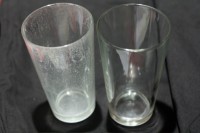
Using vinegar gel to remove white film on dishes isnt the easiest way but works great on large items that cant soak in the sink. Every dishwasher has a cup the holds the detergent for washing the dishes.

This should help get rid of white film on dishes in the dishwasher.
White film on dishes. The easiest way to remove the white film is to run your glassware and dishware through a dishwasher cycle using citric acid. You can use our Citric Acid cleaning kit or purchase citric acid at the local supermarket. Citric Acid Dishwasher Cleaning Kit Finish Dishwasher Detergent Booster.
A white milky film on glassware dishware and the interior of the dishwasher can be caused by phosphate-free dishwasher detergent. Detergents without phosphates can potentially leave a white film on glassware and other items and even the dishwasher tub itself. Using vinegar gel to remove white film on dishes isnt the easiest way but works great on large items that cant soak in the sink.
It also works well if you have a spot or two that remains on your dishes after using the dishwasher method. You will need to use some vinegar gel to soak on the dishes. After starting the dishwasher wait until the basin fills with water and then add 2 cups of white vinegar to the water and allow the dishwasher to complete its cycle.
The acid in the white vinegar will take care of the cosmetic mineral deposits on the surfaces of the dishwasher and also clean the plumbing of the spray arms and nozzles. Use white vinegar White vinegar is a readily available household product. To remove the white film from the dishes and the dishwasher itself simply add about 1 cup of the vinegar to the bottom of the dishwasher.
Then add about 3 drops of dish soap detergent and then run a hot-water cycle. Consumers started seeing residue and the white haze on their dishes and inside the dishwasher after polluting phosphates were banned from dishwasher. This can be cleaned easily with white vinegar.
Load your dishwasher up with the dishes that have a film on them and start a rinse only cycle. After the unit fills and starts to wash pause the unit and open the door. Add a cup of white vinegar and finish the rinse cycle.
Dry itchy skin after a shower. Mineral buildup around sinks drains and other water fixtures. When hard water is run through the dishwasher it can leave a film on.
Resume the wash cycle and let the vinegar wash away any mineral buildup. This should help get rid of white film on dishes in the dishwasher. Over time your hard water will add more deposits to the appliance and youll once again find your dishwasher leaving film on your dishes.
How to remove white film from glasses and the dishwasher along with tips to improve wash performance. Get Rid of Film on Dishes. Add 2-3 drops of dish soap to the detergent.
If you see that unsightly white film on your glassware or if theres a chalky residue on the bottom of your dishwasher theres one thing to blame. Dont take it personally some areas have whats called hard water as opposed to soft. John Matarese has the dirt on why so many people are finding a white film on their glasses silverware and dishes these days.
Another strong possible cause of white residue remaining on your dishes and all over the inside of your dishwasher could be you are using an excessive amount of detergent for each load of dishes that you are running. Every dishwasher has a cup the holds the detergent for washing the dishes. That white film could be caused by pre-washing or rinsing your dishes before you put them in the dishwasher.
Many of todays dishwasher detergents contain phosphates which need food residue to break down. If theres no food residue or grease the phosphates dont break down. Instead they end up on your glassware.
Our dishwasher is leaving a white film on everything and occasionally a couple pieces look completely unwashed still have food onin them. This film does not scrub off easily. Our dishwasher is about 2 12 years old new with kitchen remodel and always worked fine.
Common Reasons Why Dishwashers Leave a White And Gritty Residue Water is too hard In hard water areas limescale can affect more than just the taste of your water. The hot water can leave limescale deposits on your dishes in dishwashing cycles.